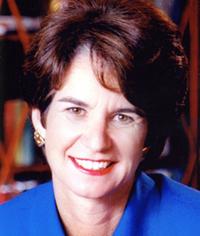 When I saw this terrific cartoon by Tom Toles in the Washington Post (see below) a couple of weeks ago, it struck a raw nerve, not just because I live with the second worst traffic jams in the country but also because the “Ask not” quote has been fresh in my mind.
When I saw this terrific cartoon by Tom Toles in the Washington Post (see below) a couple of weeks ago, it struck a raw nerve, not just because I live with the second worst traffic jams in the country but also because the “Ask not” quote has been fresh in my mind.
Last January was the 50th anniversary of my uncle John Kennedy’s inauguration and the swearing in of my father as attorney general. I had known it would be an emotional week, full of pride in what they had accomplished and sadness at the terrible loss. I went to events at the Capitol and the Kennedy Center, and I also was asked to represent my family with a talk at the Justice Department, where I had served. The week brought back the excitement of that time, the bold initiatives, the fights over civil rights, the launching of the Peace Corps.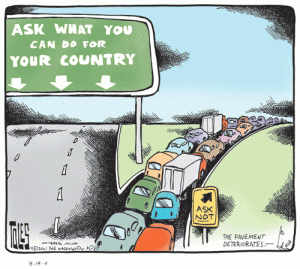
Despite the numerous citings of my uncle’s inaugural challenge, I almost never hear anything like that call to sacrifice for the good of our country from our leaders today.
The reality of the week turned even more difficult when my uncle Sargent Shriver died, as did my father’s long-time secretary, Angie Novello. The evening wake at Holy Trinity and the funeral were filled with great stories of Sarge’s enthusiasm and his determination to make the Peace Corps work. Angie, too, was honored for her steadiness and devotion.
I was filled with conflicting feelings as a slew of relatives, cousins, and their children continually met up at one memorial after another. I listened and laughed, but then I cried. The gaping holes in history and our hearts couldn’t be filled simply with memorials and great stories.
Months later, I can still feel the outpouring of affection for my family and a sense of the adventure of public service. Mostly, though, I’m puzzled by the disjunction between 1961 and now. Despite the numerous citings of my uncle’s inaugural challenge, I almost never hear anything like that call to sacrifice for the good of our country from our leaders today. Maybe they imagine that the only response would be the frantically jammed exit ramp in Tom Toles’ cartoon.
The brilliance of the cartoon is that it not only shows people choosing to do nothing for their country but also the results of that choice. When we’re all out for ourselves, when we balk at paying our fair share for basic things like public infrastructure, the result is general misery, frustration, and gridlock.
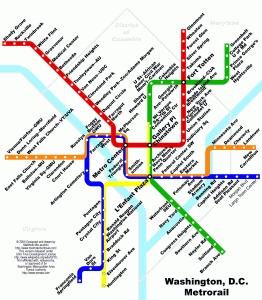 I take public transportation (the commuter train and the Metro) from Baltimore to my job in Washington. For the last month or so, I’ve walked up and down the broken escalator, glad I don’t have a heavy bag to carry, as I’ve seen others do. At the bottom I’ve been greeted by large ads that say, “Waiting for a train isn’t fun. Waiting for Congress to cut the budget is worse.”
I take public transportation (the commuter train and the Metro) from Baltimore to my job in Washington. For the last month or so, I’ve walked up and down the broken escalator, glad I don’t have a heavy bag to carry, as I’ve seen others do. At the bottom I’ve been greeted by large ads that say, “Waiting for a train isn’t fun. Waiting for Congress to cut the budget is worse.”
Worse for whom? What can the sponsors of the billboard possibly be thinking? I wonder. Commuting is miserable because budgets for trains have been slashed. Under the Republican budget the cuts would be worse, the wait longer. The ad is even stranger considering that most of the people waiting on the platform work for the federal government or a business that involves government. Budget cuts could put many of them on the street. Meanwhile, tax breaks for oil companies subsidize travel by car and the incredible traffic jams I avoid by using trains and Metro. That money should be allocated to public transportation, not to BP.
I guess not many Republicans ride the Metro. They don’t see who they’re hurting when they make sweeping pronouncements about the budget, or they don’t care about them. Of course, Metro riders are hardly the worst victims: I’m really thinking about the families on food stamps, the kids in Head Start, the girls and women who need reproductive health services, the Americans whose dignity my father fought for fifty years ago.
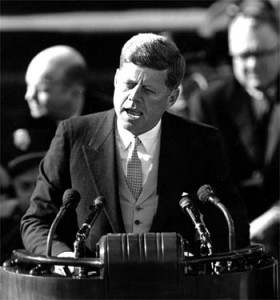 When President Kennedy asked what we could do for our country, he didn’t pretend it would be easy, or painless, or even fair. He could engage our hopes because he didn’t raise false ones. He knew that our country demanded a lot, much of it unpleasant. His older brother and many of his friends had sacrificed their lives in the war. He didn’t argue that such a sacrifice was fair. But he didn’t try to evade it, either.
When President Kennedy asked what we could do for our country, he didn’t pretend it would be easy, or painless, or even fair. He could engage our hopes because he didn’t raise false ones. He knew that our country demanded a lot, much of it unpleasant. His older brother and many of his friends had sacrificed their lives in the war. He didn’t argue that such a sacrifice was fair. But he didn’t try to evade it, either.
That’s not the message of today’s Tea Party and House Republicans. They ask nothing from their rich friends. When John Kennedy spoke on January 20, 1961, the marginal tax rate for income over $150,000 was 90 percent. I know that seems incredible, but it’s true. (My uncle reduced it to about 75 percent.) Fifty years ago, the rich felt that they would do well if America was doing well. They saw their tax dollars as investments in schools, in highways, in scientific research, so that we would all be better off.
Today we’re locked in an ideological argument about the America we believe in. On the one hand are the people who ask what their country can do for them and are happy to exacerbate inequities of wealth. On the other are those who are still committed to freedom for all, not just the freedom to sleep under a bridge, but everyone’s freedom to create a viable life and a better future. I hope we won’t relegate the notion of what we can do for our country to happy talk at anniversaries or to great cartoons. How can we even have a country if we don’t all pitch in to create it?
(Cross-posted, with permission of the author, from Atlantic.com)









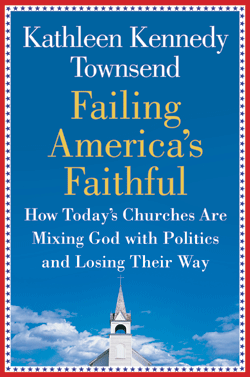
Leave a Reply